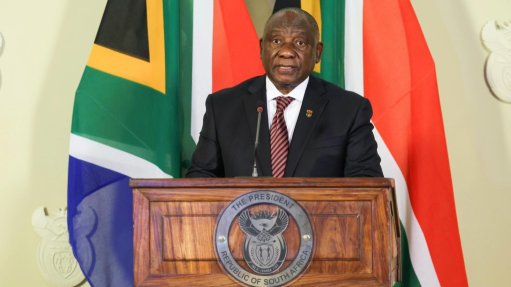On-The-Air (23/11/2018)
Every Friday, SAfm’s radio anchor Sakina Kamwendo speaks to Martin Creamer, publishing editor of Engineering News and Mining Weekly. Reported here is this Friday’s At the Coalface transcript:
Kamwendo: Platinum took the streets of London this week as the driver of the city’s first clean-air double-decker bus, which boasts zero pollution.
Creamer: The stature of platinum is growing and that is great for South Africa, because we are the main supplier. We saw in London that the first double-decker bus in the world is now driven by a fuel cell, which is catalysed by platinum, because the world is demanding clean air.
They want zero emission and that is what these fuel cells can do. We see Tokyo now declaring that all the transport at the 2020 Olympic Games will be by fuel cell driven vehicles. We see China embracing the fuel cell to the point where the Financial Times this week took on the story in London and quoted our Chris Griffith who heads the Anglo American Platinum here saying that the fuel cell is no longer a twinkle in the worlds eye. This is real. So, again fantastic news for platinum.
Kamwendo: South Africa’s wind energy industry this week committed itself to job creation and socioeconomic transformation.
Creamer: It is just like we have a Mining Charter, we now have a Wind Energy Charter. The association is saying that they want to do everything they can to be exemplary. They want to create as many jobs as they can. They want to create socioeconomic transformation and want to help entrepreneurs be able to collect funds to be able to get into wind energy, because their belief is that South Africa should be moving in this direction.
We see that the price of wind energy have halved. The price of solar energy has more than halved, so it is becoming a very competitive commodity now that people are saying this is the way South Africa should go. Dependence on coal needs to be reduced.
Kamwendo: This week’s coal conference highlighted South Africa’s huge dependence on fossil fuels, which are being cold-shouldered by the world.
Creamer: We are in a difficult situation, because South Africa and coal are synonymous when it comes to energy. Our lights are on, because coal is being burnt. It is not only being burnt in the day, but it is burnt during the night. It will be fantastic to have batteries to store all that, but we can’t.
Our dependence on coal is real and as much as we grab onto wind energy and solar energy and say we can have fuel cells, the reality is that probably in 40-year’s time we will still be heavily dependent on coal. At the moment we are dependent on coal for 87% of our energy source. People are saying the least you can do is to make that coal clean.
Of course, this is the call from the unions at the moment, they are saying we want you to stick with coal, because that is where the jobs are, but we think that you should really make sure that you have clean coal. That is easier said than done and the carbon capture and storage reaches a point of capture.
You can capture that carbon dioxide, but then what do you do with it? Have you got the underground storage that you need? What will be the transport cost to get it there? Will this then push coal into an uneconomic situation? If that happens, of course, then the wind energy, which is coming down in price, the solar energy which is coming down in price, will have to be taken into account, even by unions.
We see unions in Spain now, who were absolutely against the emergence of renewable energy, suddenly changing their tune and getting reskilled and making sure that they can benefit from lower cost energy.
Kamwendo: Thanks very much. Martin Creamer is publishing editor of Engineering News and Mining Weekly.
Article Enquiry
Email Article
Save Article
Feedback
To advertise email advertising@creamermedia.co.za or click here
Press Office
Announcements
What's On
Subscribe to improve your user experience...
Option 1 (equivalent of R125 a month):
Receive a weekly copy of Creamer Media's Engineering News & Mining Weekly magazine
(print copy for those in South Africa and e-magazine for those outside of South Africa)
Receive daily email newsletters
Access to full search results
Access archive of magazine back copies
Access to Projects in Progress
Access to ONE Research Report of your choice in PDF format
Option 2 (equivalent of R375 a month):
All benefits from Option 1
PLUS
Access to Creamer Media's Research Channel Africa for ALL Research Reports, in PDF format, on various industrial and mining sectors
including Electricity; Water; Energy Transition; Hydrogen; Roads, Rail and Ports; Coal; Gold; Platinum; Battery Metals; etc.
Already a subscriber?
Forgotten your password?
Receive weekly copy of Creamer Media's Engineering News & Mining Weekly magazine (print copy for those in South Africa and e-magazine for those outside of South Africa)
➕
Recieve daily email newsletters
➕
Access to full search results
➕
Access archive of magazine back copies
➕
Access to Projects in Progress
➕
Access to ONE Research Report of your choice in PDF format
RESEARCH CHANNEL AFRICA
R4500 (equivalent of R375 a month)
SUBSCRIBEAll benefits from Option 1
➕
Access to Creamer Media's Research Channel Africa for ALL Research Reports on various industrial and mining sectors, in PDF format, including on:
Electricity
➕
Water
➕
Energy Transition
➕
Hydrogen
➕
Roads, Rail and Ports
➕
Coal
➕
Gold
➕
Platinum
➕
Battery Metals
➕
etc.
Receive all benefits from Option 1 or Option 2 delivered to numerous people at your company
➕
Multiple User names and Passwords for simultaneous log-ins
➕
Intranet integration access to all in your organisation



















